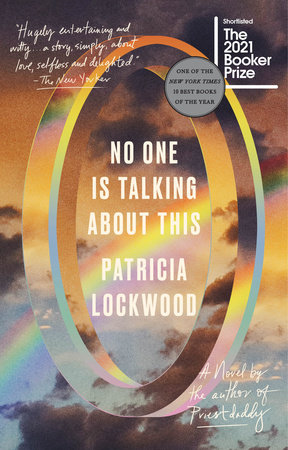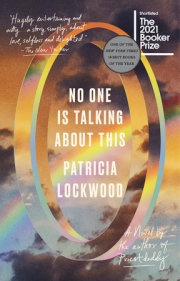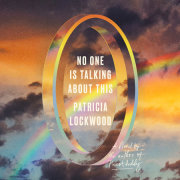Part One
She opened the portal, and the mind met her more than halfway. Inside, it was tropical and snowing, and the first flake of the blizzard of everything landed on her tongue and melted.
Close-ups of nail art, a pebble from outer space, a tarantula’s compound eyes, a storm like canned peaches on the surface of Jupiter, Van Gogh’s The Potato Eaters, a chihuahua perched on a man’s erection, a garage door -spray-painted with the words STOP! DON’T EMAIL MY WIFE!
Why did the portal feel so private, when you only entered it when you needed to be everywhere?
She felt along the solid green marble of the day for the hairline crack that might let her out. This could not be forced. Outside, the air hung swagged and the clouds sat in piles of couch stuffing, and in the south of the sky there was a tender spot, where a rainbow wanted to happen.
Then three sips of coffee, and a window opened.
I’m convinced the world is getting too full lol, her brother texted her, the one who obliterated himself at the end of every day with a personal comet called Fireball.
Capitalism! It was important to hate it, even though it was how you got money. Slowly, slowly, she found herself moving toward a position so philosophical even Jesus couldn’t have held it: that she must hate capitalism while at the same time loving film montages set in department stores.
Politics! The trouble was that they had a dictator now, which, according to some people (white), they had never had before, and according to other people (everyone else), they had only ever been having, constantly, since the beginning of the world. Her stupidity panicked her, as well as the way her voice now sounded when she talked to people who hadn’t stopped being stupid yet.
The problem was that the dictator was very funny, which had maybe always been true of all dictators. Absurdism, she thought. Suddenly all those Russian novels where a man turns into a teaspoonful of blackberry jam at a country house began to make sense.
What had the beautiful thought been, the bright profundity she had roused herself to write down? She opened her notebook with the sense of anticipation she always felt on such -occasions—perhaps this would finally be it, the one they would chisel on her gravestone. It read:
chuck e cheese can munch a hole in my -youknow-what
After you died, she thought as she carefully washed her legs under the fine needles of water, for she had recently learned that some people didn’t, you would see a little pie chart that told you how much of your life had been spent in the shower arguing with people you had never met. Oh but like that was somehow less worthy than spending your time carefully monitoring the thickness of beaver houses for signs of the severity of the coming winter?
Was she stimming?? She feared very much that she was.
Things that were always there:
The sun.
Her body, and the barest riffling at the roots of her hair.
An almost music in the air, unarranged and primary and swirling, like yarns laid out in their colors waiting.
The theme song of a childhood show where mannequins came to life at night in a department store.
Anonymous History Channel footage of gray millions on the march, -shark-snouted airplanes, silk deployments of missiles, mushroom clouds.
An episode of True Life about a girl who liked to oil herself up, get into a pot with assorted vegetables, and pretend that cannibals were going to eat her. Sexually.
The almost-formed unthought, Is there a bug on me???
A great shame about all of it, all of it.
Where had the old tyranny gone, the tyranny of husband over wife? She suspected most of it had been channeled into weird ideas about supplements, whether or not vinyl sounded “warmer,” and which coffeemakers were nothing but a shit in the mouth of the coffee christ. “A hundred years ago you would have been mining coal and had fourteen children all named Jane,” she often marveled, as she watched a man stab a finger at his wife in front of the Keurig display. “Two hundred years ago, you might have been in a coffee shop in Göttingen, shaking the daily paper, hashing out the questions of the -day—and I would be shaking out sheets from the windows, not knowing how to read.” But didn’t tyranny always feel like the hand of the way things were?
It was a mistake to believe that other people were not living as deeply as you were. Besides, you were not even living that deeply.
The amount of eavesdropping that was going on was enormous, and the implications not yet known. Other people’s diaries streamed around her. Should she be listening, for instance, to the conversations of teenagers? Should she follow with such avidity the compliments that rural sheriffs paid to porn stars, not realizing that other people could see them? What about the thread of women all realizing they had the exact same scar on their knee? “I have that scar too!” a white woman piped up, but was swiftly and efficiently shut down, because it was not the same, she had interrupted an usness, the world in which she got that scar was not the same.
She lay every morning under an avalanche of details, blissed, pictures of breakfasts in Patagonia, a girl applying her foundation with a -hard-boiled egg, a shiba inu in Japan leaping from paw to paw to greet its owner, ghostly pale women posting pictures of their -bruises—the world pressing closer and closer, the spiderweb of human connection grown so thick it was almost a shimmering and solid silk, and the day still not opening to her. What did it mean that she was allowed to see this?
If she began to bite her lower lip, as she nearly always did after the milk and -civet-cat bitterness of her morning coffee, she went into the bathroom with the ivy growing out its bangs outside the window and very carefully painted her mouth a definite, rich, top-of-the-piano -red—as if she had an underground club to be at later that night, where she would go as bare as a missing sequin, where she would distill the whole sunset cloud of human feeling to a -six-word lyric.
Something in the back of her head hurt. It was her new class consciousness.
Every day their attention must turn, like the shine on a school of fish, all at once, toward a new person to hate. Sometimes the subject was a war criminal, but other times it was someone who made a heinous substitution in guacamole. It was not so much the hatred she was interested in as the swift attenuation, as if their collective blood had made a decision. As if they were a species that released puffs of poison, or black ink in a cloud on the ocean floor. I mean, have you read that article about octopus intelligence? Have you read how octopuses are marching out of the sea and onto dry land, in slick and obedient armies?
“Ahahaha!” she yelled, the new and funnier way to laugh, as she watched footage of bodies being flung from a carnival ride at the Ohio State Fair. Their trajectories through the air were pure arcs of joy, T-shirts turned liquid on them, just look what the flesh could do when it gave in, right down to the surrendering snap of -the . . .
“What’s so hilarious,” said her husband, resting sideways on his chair with his bladelike shins dangling over one arm, but by then she had scrolled down the rest of the thread and seen that someone was dead, and five others hanging half in and -half -out of the world. “Oh God!” she said as she realized. “Oh Christ, no, oh God!”
At nine o’clock every night she gave up her mind. Renounced it, like a belief. Abdicated it, like a throne, all for love. She went to the freezer and opened that fresh air on her face and put fingerprints in the frost on the neck of a bottle and poured something into a glass that was very very clear. And then she was happy, though she worried every night, as you never do with knowledge, whether there would be enough.
Copyright © 2021 by Patricia Lockwood. All rights reserved. No part of this excerpt may be reproduced or reprinted without permission in writing from the publisher.













